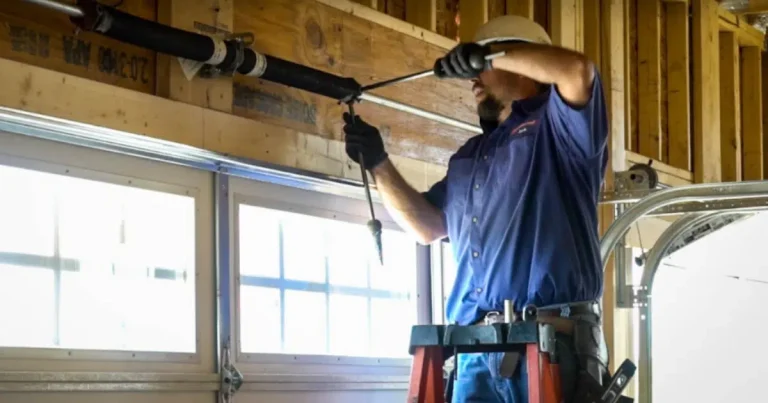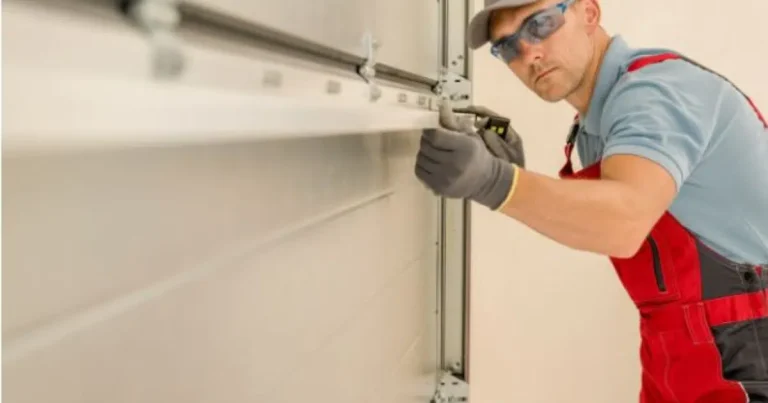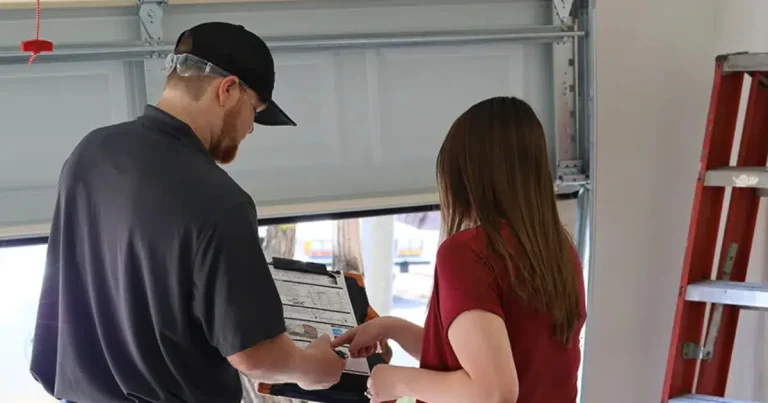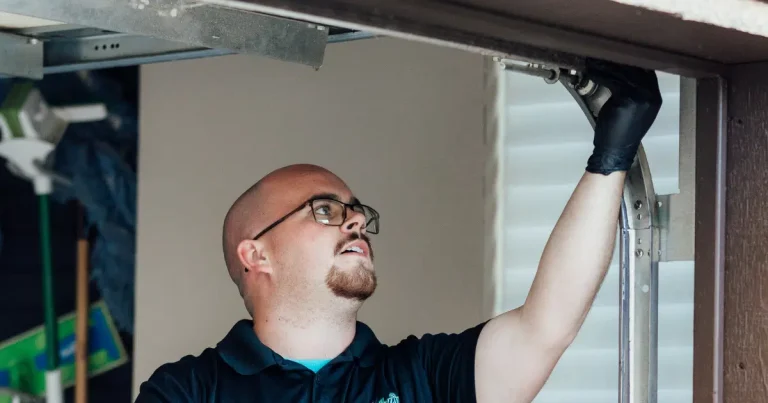Can I service my own garage door? Discover safe DIY tips, key tools, and when to call a pro. Know before you try!
It usually starts with a squeak, followed by a grinding noise. Before long, your garage door refuses to close properly, leaving you scrambling for DIY tutorials and asking, “Can I service my own garage door?” This question is more common than you might think, especially when minor issues seem simple enough to tackle alone.
While basic maintenance tasks like lubricating rollers or tightening loose bolts are generally safe, knowing your limits is important. Garage doors are complex systems with high-tension springs and sensitive components that can pose serious risks. That’s why Guardian Garage Door & Gates offers expert guidance to help homeowners determine what they can safely do—and when it’s time to call in the professionals.
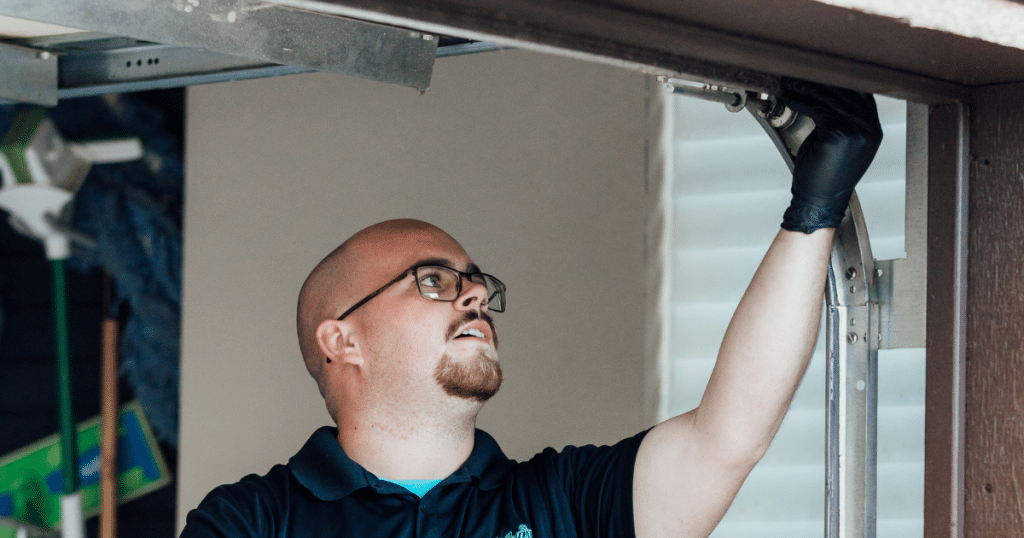
Why Some Homeowners Consider DIY Garage Door Service
DIY garage door service is tempting for several reasons. First, the potential for cost savings is hard to ignore. Replacing a remote battery or realigning a sensor seems simple enough, and avoiding a service call feels like a win.
Second, the internet is full of video tutorials and guides, making it seem like anyone with a toolbox can be a technician. You can find step-by-step walkthroughs for everything from lubricating tracks to resetting openers with just a few clicks.
Finally, specific tasks, like cleaning or tightening hardware, are straightforward. These small victories can give homeowners a sense of confidence. But this can be misleading. What appears simple on the surface may hide underlying mechanical issues that only a trained technician would recognize.
What Garage Door Service Involves
Common Service Tasks Homeowners Try
Many homeowners tackle basic maintenance tasks to keep their garage door functioning smoothly. These include:
- Lubricating rollers, hinges, and tracks with silicone-based sprays.
- Replacing dead remote batteries or wall-mounted control switches.
- Cleaning and realigning photo-eye sensors to resolve minor closing issues.
- Visually inspecting springs, cables, and hardware for signs of wear.
While these activities are generally safe, they also have limitations. Visual inspections don’t reveal internal damage, and cleaning sensors won’t fix a failing circuit board. Overconfidence can lead to mishandling something far more serious.
Advanced Repairs That Require Professional Help
Some garage door issues demand specialized knowledge and equipment. Attempting these repairs without training can lead to injury or cause further damage. These high-risk tasks include:
- Torsion or extension spring repairs (under high tension)
- Replacing frayed or broken cables
- Realigning misaligned or sagging panels
- Fixing opener motor issues or circuit board malfunctions
- Adjusting bent tracks or rebalancing the door system
These aren’t just tricky. They’re dangerous. A misstep with a tension spring can result in serious injury. That’s why Guardian Garage Door & Gates advises against attempting these repairs at home.
Is It Safe to Service Your Own Garage Door?
Hidden Dangers of DIY Repairs
Garage doors are heavier and more complex than they appear. The average door can weigh between 130 and 400 pounds, depending on the material and design. Combined with spring systems under intense pressure, the risk of injury is significant.
Some common DIY risks include:
- Tension spring injuries (lacerations, fractures, or worse).
- Incorrect repairs that compromise the door balance and cause collapse.
- Crushed fingers or strained backs during manual door handling.
- Electrical shock or short circuits when dealing with openers.
Even if a repair seems to work temporarily, it may cause hidden damage that leads to more expensive issues later on.
Tools, Training, and Safety Gear Professionals Use
Garage door technicians use specialized tools such as torsion spring winding bars, cable tension tools, and laser alignment systems. They also wear protective gear, follow lockout procedures, and complete routine safety checks during every visit.
Guardian Garage Door & Gates professionals are trained to diagnose both surface-level and underlying issues, ensuring safe, long-lasting repairs.
Warranty and Insurance Considerations
How DIY Repairs Can Void Warranties
Most garage door systems come with manufacturer warranties. But those warranties are often voided if repairs are made by an unlicensed individual or if incorrect parts are installed.
Common violations include:
- Installing third-party parts not approved by the manufacturer
- Performing structural changes without documentation
- Damaging the opener or spring system due to improper techniques
Once voided, future repairs or replacements may no longer be covered.
Insurance Risks and Liability Exposure
Homeowners’ insurance may not cover damages or injuries resulting from unlicensed repairs. This includes:
- Property damage caused by a door falling off its track
- Personal injury from spring recoil or electrical issues
- Structural issues if the repair affects the garage frame or door alignment
To stay protected, rely on Guardian Garage Door & Gates, whose licensed service meets all warranty and insurance requirements.
When You Can Handle Garage Door Maintenance Yourself
Routine Tasks Homeowners Can Safely Perform
There are several low-risk actions that homeowners can confidently manage between service appointments:
- Inspecting hardware for rust, looseness, or signs of wear
- Cleaning the photo-eye sensors with a soft cloth
- Applying lubricant to rollers, hinges, and tracks
- Testing the auto-reverse safety feature monthly by placing a small object under the door and checking its response
These preventive steps can extend the life of your system and alert you to issues early on.
When It’s Time to Call the Pros
You should never attempt repairs that involve moving parts, wiring, or heavy components. Call Guardian Garage Door & Gates if you notice:
- The door is off its track or uneven when closing
- Loud grinding, squealing, or jerking motions during operation
- Frayed or broken cables or springs
- Complete failure of the opener or remote control
- Any damage involving the motor, circuit board, or internal wiring
These issues signal serious problems that require professional intervention.
How Guardian Garage Door & Gates Protects You From Risk
When it comes to new garage door safety, expertise makes all the difference. Here’s how Guardian Garage Door & Gates stands out:
- Certified technicians experienced with all major brands and models
- Safety-first protocols, especially with springs, cables, and tracks
- Rapid local response times, reducing downtime and frustration
- Guaranteed workmanship, ensuring lasting reliability
- Transparent advice, guiding you on what you can do—and what you shouldn’t
With Guardian Garage Door & Gates, you’re never left guessing. Their team helps you maintain peace of mind, prevent accidents, and protect your investment.
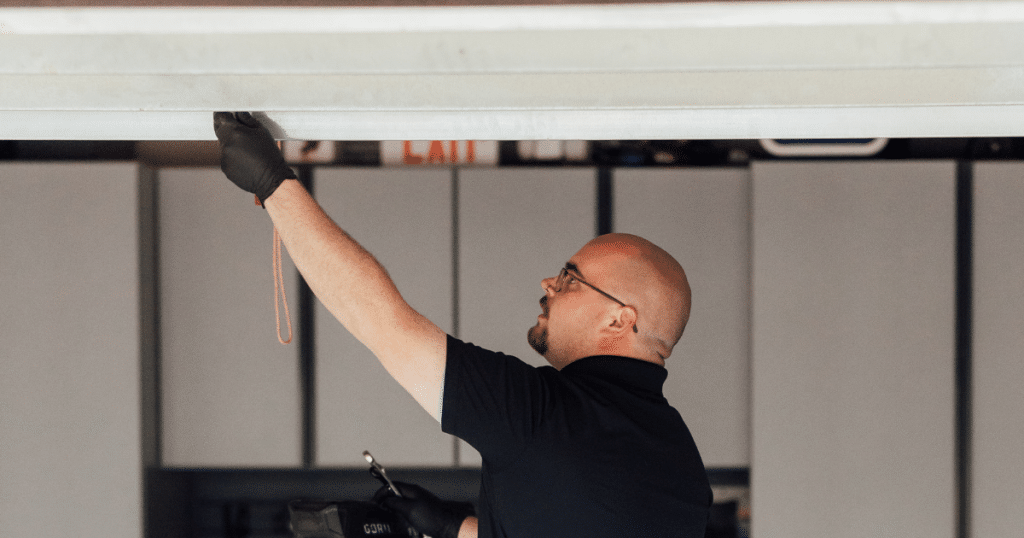
Frequently Asked Questions
Do I Need Permission to Change My Garage Door?
You may need permission or a permit in many areas before changing your garage door, especially if it affects the exterior appearance or structure. Local building codes, HOA rules, or zoning regulations might apply. Always check with your municipality to ensure compliance before beginning any garage door replacement project.
What Is the Common Problem of a Garage Door?
The most common problems with garage doors are malfunctioning openers or worn-out springs. These issues often cause the door to stop opening or closing properly. Regular maintenance, including lubrication and inspection, can help prevent these common garage door problems and keep your system running smoothly.
What Is the Most Common Garage Door Repair?
The most frequent garage door repair involves replacing broken torsion or extension springs. These components handle heavy lifting and tend to wear out over time. A broken spring can prevent the door from opening, so it should be repaired immediately to restore functionality and maintain safety.
How Many Years Does a Garage Door Last?
A typical garage door lasts 15 to 30 years, depending on material, usage, climate, and maintenance. Steel and aluminum doors tend to last longer, while wood may require more upkeep. Performing regular maintenance and addressing issues early can help maximize the lifespan of your garage door.
How Do You Know When Your Garage Door Needs to Be Replaced?
Frequent breakdowns, loud noises, sagging sections, or outdated safety features are signs that your garage door may need replacement. If repairs become costly or the door looks visibly worn, replacing it may offer better security, energy efficiency, and curb appeal than ongoing garage door repairs.
Conclusion
Can I service my own garage door? The answer is yes for minor tasks like wiping down the panels or applying lubricant. But it’s best to leave it to the professionals once springs, cables, or openers get involved. Handling high-tension components without proper training can lead to serious injury or costly damage that isn’t worth the risk.
Guardian Garage Door & Gates offers trusted, expert-level support when DIY isn’t enough. Their licensed team understands every system inside and out, helping homeowners make safe, informed choices. If you’re asking, “Can I Service My Own Garage Door?”—start with a consultation. They’ll explain what you can do safely and step in when expert service is needed.
End Note
Guardian Garage Door & Gates is your trusted partner for expert garage door solutions, tailored to your home’s specific needs. Whether you’re exploring Clopay doors, LiftMaster openers, or considering a full door transformation, our experienced team is here to help. Learn more about us and discover why local homeowners choose us.
Explore our full range of services, from gate automation to fencing solutions, all backed by real customer satisfaction—just check out our testimonials. When you’re ready, contact us for honest answers, expert recommendations, and dependable repairs. Visit guardianstl.com to get started today.


